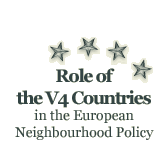
 |
 |
 |
 |
 |
 |
 |
 |
 |
 |
 |



|
|
About the workshop
The new European Neighbourhood Policy (ENP) was developed in 2004 to strengthen the prosperity, stability and security of all parties. The participants would like to examine the possible role of the V4 countries in this policy especially regarding Belarus, Moldova, and Ukraine. These states are of particular importance for the V4 countries. The workshop is intended to overview the implementation of EU Action Plans adopted by the EU in relation to Moldova and Ukraine. The participants will intensively discuss the special geopolitical, strategic position with in the implementation of ENP and in particular the treaty relations with these countries (Partnership and Co-operation Agreements). Belarus is a special case in this regard: the project shall examine the perspectives of possible amelioration of EU-Belarus relations. Moreover, the project will examine these countries and their specific politics and interests in Eastern Europe, with special regard to the new challenges stemming from the changing role of EU Foreign Policy in the new structure of the Lisbon Treaty.
The future of the above mentioned countries in their way towards their participation in European integration is still gloomy and the V4 countries may help in this process, building on their geopolitical position and on their previous experience of accession to the EU. Especially the position of Ukraine and Moldova may change in the long term, offering a closer involvement in EU integration: the project shall shed light on the different perspectives and approaches of V4 countries to this process within the broader framework EU foreign policy. The project aims to reach researchers and students in the academic world who are interested in the challenges of EU Neighbourhood Policy. The workshop will be an open forum for discussion for interested students and academics, thus providing a perfect occasion to reflect on the achievements of the participating organisations and the presentations given at the workshop. The expected outcome may help in enhancing further debate on the role of the V4 countries in influencing and operating EU Neighbourhood Policy. It could be useful also for university education providing additional materials for students in international studies in the V4 countries. |
politologia4@ektf.hu
